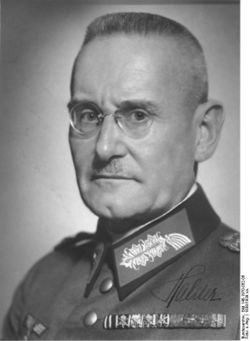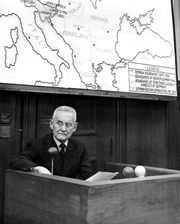Franz Halder
| Franz Halder | |
|---|---|
| 30 June 1884 – 2 April 1972 (aged 87) | |
 Franz Halder |
|
| Place of birth | Würzburg, Germany |
| Place of death | Aschau im Chiemgau, Bavaria |
| Allegiance | |
| Years of service | 1902 - 1945 |
| Rank | Generaloberst |
| Battles/wars | World War I World War II |
| Awards | Ritterkreuz des Eisernen Kreuzes |
Franz Halder (June 30, 1884 – April 2, 1972) was a German General and the head of the Army General Staff from 1938 until September, 1942, when he was dismissed after frequent disagreements with Adolf Hitler.
Contents |
Early life
Halder was born in Würzburg to General Max Halder. In 1902 he joined the 3rd Royal Bavarian Field Artillery Regiment in Munich. He was promoted to lieutenant in 1904 upon graduation from War School in Munich, then he attended Artillery School (1906–07) and the Bavarian Staff College (War Academy) (1911–1914), both in Munich.
World War I
In 1914 during World War I, Halder became an Ordnance Officer, serving in the Headquarters of the Bavarian 3rd Army Corps. In August, 1915 he was promoted to Hauptmann (Captain) on the General Staff of the Crown Prince of Bavaria's 6th Infantry Division. During 1917 he served as a General Staff officer in the Headquarters of the 2nd Army, before being transferred to the 4th Army.
Interwar era
Between 1919 and 1920 Halder served with the Reichswehr War Ministry Training Branch. Between 1921 and 1923 he was a Tactics Instructor with the Wehrkreis VII in Munich.
In March 1924 Halder was promoted to major and by 1926 he served as the Director of Operations (Oberquartiermeister of Operations: O.Qu.I.) on the General Staff of the Wehrkreis VII in Munich. In February 1929 he was promoted to Oberstleutnant (lieutenant colonel), and from October 1929 through late 1931 he served on the Training staff in the Reichswehr Ministry.
After being promoted to Oberst (colonel) in December 1931, Halder served as the Chief of Staff, Wehrkreis Kdo VI, in Münster (Westphalia) through early 1934. During the 1930s the German military staff thought that Poland might attack the detached German province of East Prussia. As such, they reviewed plans as to how to defend East Prussia.
After being promoted to Generalmajor (a Brigade commander, hence the equivalent of a US Army brigadier general) in October 1934, Halder served as the Commander of the 7th Infantry Division in Munich.
Recognized as a fine staff officer and planner, in August 1936 Halder was promoted to Generalleutnant (rank of a divisional commander, hence equivalent to a US Army Major General). He then became the director of the Manoeuvres Staff. Shortly thereafter, he became director of the Training Branch (Oberquartiermeister of Training, O.Qu.II), on the General Staff of the Army, in Berlin between October 1937 and February 1938. During this period he directed important training maneuvers, the largest held since the reintroduction of conscription in 1935.
On February 1, 1938 Halder was promoted to General der Artillerie (equivalent to a US Army lieutenant general). Around this date General Wilhelm Keitel was attempting to reorganize the entire upper leadership of the German Army. Keitel had asked Halder to become Chief of the General Staff (Oberquartiermeister of operations, training & supply; O.Qu.I ) and report to General Walther von Reichenau. However, Halder declined as he felt he could not work with Reichenau very well, due to a personality dispute. As Keitel recognized Halder's superior military planning skills, Keitel met with Hitler and enticed him to appoint General Walther von Brauchitsch as commander-in-chief of the German Army. Halder then accepted becoming Chief of the General Staff of the Army (Oberkommando des Heeres) on September 1, 1938, and succeeded General Ludwig Beck.
A week later, Halder presented plans to Hitler on how to invade Czechoslovakia with a pincer movement by General Gerd von Rundstedt and General Wilhelm Ritter von Leeb. Instead, Hitler directed that Reichenau should make the main thrust into Prague. Neither plan was necessary once British Prime Minister Neville Chamberlain brokered the "Munich Agreement", by surrendering the Czech region of Sudetenland to Germany. Just before Chamberlain capitulated to Hitler, Halder — in an attempt to avoid war — discussed with several other generals the idea of removing Hitler from power. However, on September 29 Chamberlain gave in to Hitler’s demands, and Halder’s plot to remove Hitler died as peace had been preserved. Two days later, on October 1, German troops entered the Sudetenland.
World War II
During the spring of 1939, Halder began participating in drafting the invasion plans of Poland. Halder stated that he thought Polish soldiers were stupid, and thought the war could be over within 2–3 weeks.
On September 1, 1939 Germany invaded Poland and thereby started World War II. On September 19 Halder noted in his diary that he had received information from the SS Commander Reinhard Heydrich that the SS was beginning its campaign to "clean house" in Poland of Jews, intelligentsia, Catholic Clergy, and the aristocracy. This led to future criticism by historians that Halder knew about the killings of Jews much earlier than he later acknowledged during post-World War II interviews, and that he failed to object to such killings. Halder noted in his diary his doubts "about the measures intended by Himmler".[1]
During November 1939, Halder conspired with General Brauchitsch that he would support Brauchitsch if he were to try to curtail Hitler’s plans for further expansion of the war, but Brauchitsch declined (the so-called Zossen Conspiracy). While Halder opposed Hitler’s expanded war plans, like all officers he had taken a personal loyalty oath to Hitler. Thus, he felt unable to take direct action against the Führer. At one point, Halder thought the situation to be so desperate that he considered shooting Hitler himself.[2] A colonel close to Halder noted in his diary that "Amid tears, Halder had said for weeks that he had a pistol in his pocket every time he went to Emil [cover name for Hitler] in order to possibly gun him down."[2]
At the end of 1939, Halder oversaw development of the invasion plans of France, the Low Countries, and the Balkans. Halder initially doubted that Germany could successfully invade France. General Erich von Manstein's bold plan for invading France through the Ardennes Forest proved successful, and ultimately led to the capture of France. On July 19, 1940 Halder was promoted to Generaloberst (literally "highest general" - frequently mistranslated as Colonel General - rank of an Army commander equivalent to a US Army 4 star or Full General). In August, he began working on Operation Barbarossa, the invasion plan for the Soviet Union. Shortly thereafter, to curtail Halder’s military-command power, Hitler limited the General's involvement in the war by restricting him to developing battle plans for only the Eastern Front. Halder appeared on the June 29, 1942 cover of Time magazine.

During the summer of 1942 Halder told Hitler that he was underestimating the number of Russian military units; Hitler argued that the Russians were nearly broken. Furthermore, Hitler did not like Halder’s objections to sending General Manstein’s 11th Army to assist in the attack against Leningrad. Halder also had thought that the German attack into the Caucasus was ill advised. Finally, because of Halder’s disagreement with Hitler’s conduct of the war, Hitler decided that the General no longer possessed an aggressive war mentality, and therefore retired Halder into the "Fuhrer Reserve" on September 24, 1942.
On July 20, 1944 a group of German army officers attempted to assassinate Hitler. The following day Halder was arrested by the Gestapo, although he was not involved in the assassination attempt. As Hitler considered Halder a possible leader who could overthrow him, Halder was imprisoned at both the Flossenbürg and the Dachau concentration camps. On January 31, 1945 Halder was officially dismissed from the army. Together with some members of the July 20 plot and other notable prisoners he was transferred to Tyrol, where he was liberated by US troops on May 4 [3] after the SS guards fled. Halder spent the next two years in a prisoner of war camp.
After World War II
During the 1950s, Halder worked as a war historian advisor to the U.S. Army Historical Division. During the early 1950s Halder advised on the redevelopment of the post-WWII German army (see: Searle's "Wehrmacht Generals"). He died in 1972 in Aschau im Chiemgau, Bavaria.
Awards
- 1914 Iron Cross 1st and 2nd Class
- 1939 Clasps to the Iron Cross 1st and 2nd Class
- Knight's Cross of the Iron Cross (27 October 1939)
- Prussian Royal House Order of Hohenzollern, Knight's Cross with Swords
- Bavarian Military Merit Order, 4th Class with Crown and Swords
- Saxon Albert Order, Knight 1st Class with Swords
- Austro-Hungarian Military Merit Cross, 3rd Class with War Decoration
- Cross of Honor (Ehrenkreuz für Frontkämpfer)
- U.S. Meritorious Civilian Service Award (1961)[4]
Publications
Halder wrote Hitler als Feldherr in German (1949) which was translated into English as Hitler as War Lord (1950); and The Halder Diaries (1976). The latter diaries were later used by American historian William Shirer, as a major primary source for his monumental work The Rise and Fall of the Third Reich, along with other confidential documents and manuscripts.
In reviewing Halder's personality, the British author Hugh Trevor-Roper wrote: "Halder is a military snob, believing that no amateur can ever understand the mysteries of war." Author Kenneth Macksey wrote: "Quick, shrewd and witty, he was a brilliant specialist in operational and training matters and the son of a distinguished general. He supported Beck's resistance to Hitler, but when it came to a crunch was no real help. Flirt as he did, in September, with those opposed to Hitler, he toed the party line when extreme pressure was exerted for the return of the Sudetenland and its German nationals by the Czechs to Germany." Many see Halder as a soldier of the older Prussian school variety. Like General Field Marshal von Manstein, an officer "bound to duty and oath."
For other insights regarding Halder's capabilities, see: Christian Hartmann and Sergei Slutsch, Franz Halder und die Kriegsvorbereitungen im Frühjahr 1939. Eine Ansprache des Generalstabschefs des Heeres in the journal Vierteljahrshefte für Zeitgeschichte (July 1997); Christian Hartmann, Halder: Generalstabschef Hitlers: 1939-1942, (1991), and Hitler's Generals, edited by Correlli Barnett.
The historians Ronald Smelser and Edward J. Davies II in The Myth of the Eastern Front (Cambridge University Press, 2008) argue that, after 1945, Halder played a key role in creating a false and mythic view of the Nazi-Soviet war in which the Wehrmacht was largely blameless for both Germany's military defeat and its war crimes.
Searle, Alaric. Wehrmacht Generals, West German Society, and the Debate on Rearmament, 1949-1959, Praeger Pub., 2003.
Notes
- ↑ Hitler Strikes Poland, pp. 22, 116 and 176
- ↑ 2.0 2.1 Frieser, Karl-Heinz and John T. Greenwood, "The Blitzkrieg Legend", Naval Institute Press, 2005, ISBN 1591142946
- ↑ Hartmann, Christian: Halder. Generalstabschef Hitlers 1938-1942, Paderborn: Schoeningh 1991, ISBN 3506774840
- ↑ "The Private War Journal of Generaloberst Franz Halder - Summary Guide". Liddell Hart Centre for Military Archives. http://www.kcl.ac.uk/lhcma/summary/xp70-001.shtml. Retrieved 2007-07-03.
References
- Burdick, Charles, Jacobsen, Hans-Adolf. (1988). The Halder War Diary 1939-1942. New York: Presidio Press. ISBN 0-89141-302-2.
- Taylor, Telford. Sword and Swastika. Chicago: Quadrangle, 1952. Print.
External links
| Military offices | ||
|---|---|---|
| Preceded by Ludwig Beck |
Chief of the Army General Staff September 1938 - September 1942 |
Succeeded by Kurt Zeitzler |
| Awards and achievements | ||
| Preceded by Henry Arnold |
Cover of Time Magazine 29 June 1942 |
Succeeded by The American Flag |
|
||||||||||||||||